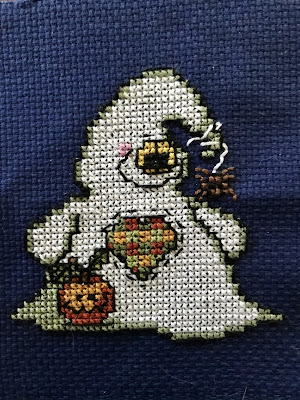Friday, 22 October 2021
Friday Five: Halloween Cross-Stitch
Wednesday, 20 October 2021
Macho Noir: Paint It Black
Nick Sharman has been around for
a while apparently; this is the eleventh novel in a series of nineteen and
counting, starting in 1988 (this one was first published in 1995). He is the
narrator of these novels about himself, a South London ex-policeman now private
detective, in a world where women exist only to be rescued or revenged, and full
of the sort of hard man dialogue and soulless quips that would even embarrass Guy
Ritchie. But author, Mark Timlin, is very popular – one doesn’t publish nearly
twenty books in a series without being – and reviewers consider him to provide
an “answer to the hardboiled noir of 1940’s America, uprooted lock, stock, and
barrel to the dingy back streets of 1980’s south London”. I suppose I didn’t
realise anyone was asking the question.
Nick Sharman gets a call from his
ex-wife Laura in Glasgow to tell him that their daughter, Paula, has gone missing.
He and his wife, Dawn, track her down to a field in Banbury where she is with a
bunch of travellers, having accompanied her friend, Paula. Paula is a ‘bad
influence’ and they have taken drugs, but she has a heart of gold; yes the clichés
are that obvious. At this point, he could simply take the girls back home, “The
case of the private detective’s daughter webbed up in the rave scene has come
to a satisfactory conclusion.” Of course he chooses instead to track down the
dealers and blow up a shipment of their drugs. They take their revenge by
killing Dawn and their unborn child. He then retaliates in a plan that goes
horribly wrong but involves a lot of killing, guns and explosives.
Ah yes, the guns. Timlin loves sex, violence, cars and travel routes. He describes ammunition as though it were a fashion accessory. He does love his detail – desperate to prove his tough-guy credentials like something out of a bad Ross Kemp documentary. He enjoys deadpan wisecracks; when he arrives at a secret location and is told, “We’re here”, he replies, “Everybody’s got be somewhere” as if that means something deep.
When he gets
onto his obsession with cars and directions, however, he sounds more like a boring
salesman at an unspeakably tedious conference team-building dinner. “We got
back into the Mondeo and took off down the secondary road in what I guessed to
be a southerly direction for a few miles until we came to a village called
Frating Green, where the A133 bisected the B1029, and we swapped cars again. I
found a Volkswagen Golf GTI neatly parked on a grass verge, whose doors opened
to my hoister’s key.”
And then there’s the bit where,
despite the fact he has a teenage daughter whom he apparently adores, he still
has sex with her friend, Paula, after she has specifically told him she is fifteen.
“I had my arms full of a tiny, slippery little female who wanted a fuck. So I
gave her one. Right or wrong, that’s what I did. And I enjoyed it, and so did
she.” That is statutory rape; there is no question about this – it’s wrong.





